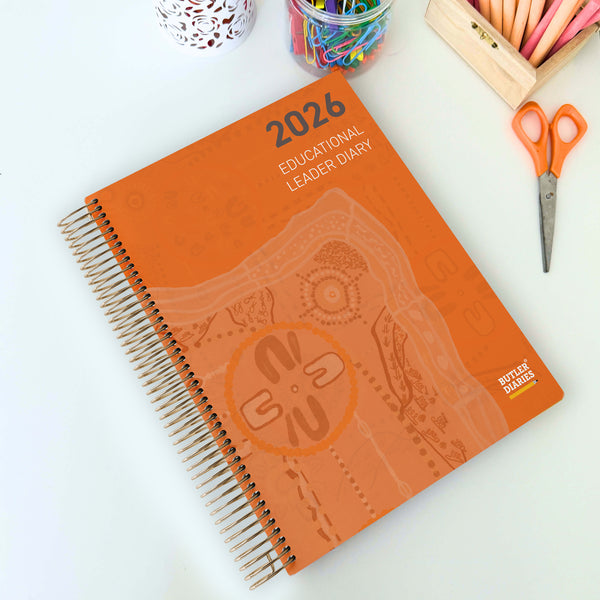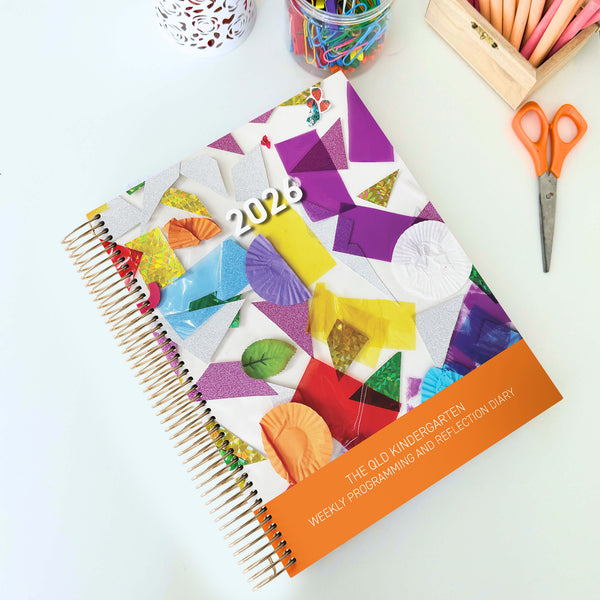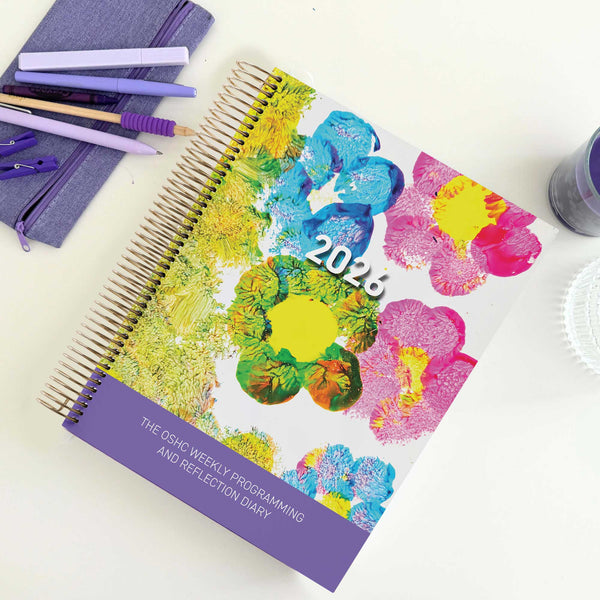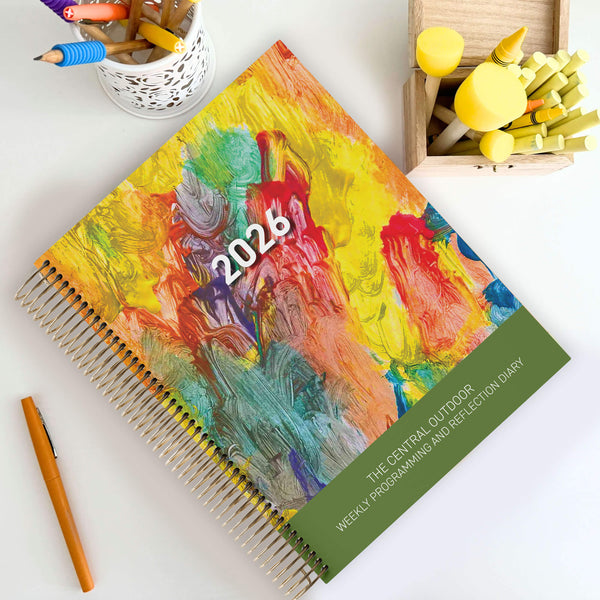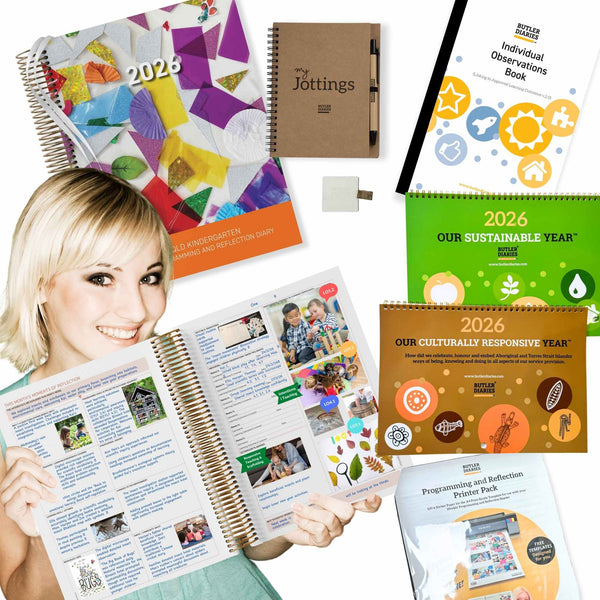Here's a quick guide to the Educational Leader Diary to maximise the way it's being used in your service.
Day Pages of the Educational Leader Diary
Focus Educators / Rooms Today
This box is designed to be a quick reference snapshot of which rooms or educators your focus was on that day. It's unrealistic to think you will be able to support every room and every Educator every day.
You can use this box to pre-plan which Educators you'll focus on when and also record Educators or Rooms that spontaneously ended up being your focus.
Meetings/Orientations/Training
This box records what meetings, orientations or training is booked for that particular day. As well as showing evidence for Assessment purposes, it helps you keep track of your obligations and those of staff. It can also act as a reminder to follow up with these Educators for summaries or notes on their training to share with the rest of the team.
 Reflective Discussions on Practice for Today
Reflective Discussions on Practice for Today
This is where you record the evidence of the discussions you had today. This essentially expands on those first two boxes and should capture notes on what you discussed with focus Educators.
You can also reference their respective Weekly Programming and Reflection Diaries to show you collaborated with the Educator to explore the strengths and possible improvements of their program and cycle of planning.
In addition to providing evidence of these discussions, this space also acts as a basis for your own personal reflections so you can:
- Identify room for improvement,
- Note resources or information you need to gather,
- Book professional development for staff,
- Create agendas for staff meetings,
- Identify improvements in the support you are providing,
- Update your QIP, policies and procedures,
- and more!
Professional Development Requirements Identified
As mentioned above, your reflective discussions should outline Educator's strengths and identify areas for improvement. You can note the Educator(s) under 'Who', the topic or learning focus under 'What' and when you've had a chance to find appropriate professional development and book it, update 'When'.
Family/Community Communication
As Educational Leader, you're also responsible for Families' understanding of the centre's philosophy, programming and practice. You may identify points to discuss with families from your reflective discussions with Educators, from your own observations or by viewing the 'Parent Input' in the Educators' Weekly Programming and Reflection Diary. You can also record any discussions you have for families seeking feedback on their understanding of the room's program and learning, this will help assess whether rooms are making their cycle of planning visible for everyone.
Getting the Most from the Day Pages of the Educational Leader Diary
The Educational Leader Diary when used correctly acts as a Reflection Tool and shows how critical reflection is being used within the team to improve outcomes for children. It demonstrates and captures evidence of the role of the Educational Leader and the work they are doing to support Educators. If you want to learn more about this role and the expectations around Educational Leaders, download this free checklist.
To get the most from the Educational Leader Diary and show quality improvement, you should spend some time pre-planning in terms of who are the Focus Educators / Rooms of the day or week and the Meetings/Orientations/Training you’ve booked in. For example, in the Diary you should be able to see all Educators are supported, Educators requiring additional support are given this time, and meetings and training are planned to provide the best outcomes for Educators while considering ratios.
The Reflective Discussions from these are recorded and you can clearly see how they have been used to complete the Professional Development Requirements section and Family/Community Communication.
You should also link back to the Reflective Discussions when improving policies, procedures, and QIP and when planning Agendas for meetings or training. You will also link back to these discussions when reflecting at the end of the week.
Weekend Spread of the Educational Leader Diary
Personal Leadership Reflections on the Week
Here is where you stop to reflect on your own practice. Look back at your reflective discussions and consider how you can improve the support you provide? Could meetings be better planned to allow all Educators to participate in reflective discussions? Is there a balance of on the floor and off the floor time? Is there a particular area many Educators appear to be confused on? Can you provide more support or information on this area? Will a different approach be more beneficial for a particular Educator?
Personal Leadership Goals for the Week
Based on your reflections, set goals for yourself for the following week. When you get to the next Weekend Spread, don't forget to reflect on whether you met these goals as well as your Reflective Discussions from the week.
Weekly Checklist
This checklist can be considered a guide of the areas you should be covering with staff for example, focusing on understanding of NQS and ALFs, ensuring curriculums align with service philosophy, vision, policies, and procedures, and ensuring cultural responsiveness is visible in the program and reflections.
You do not need to check every box every week. It will be unlikely you'll be able to explore all these topics every week and should therefore act as a guide to make sure you address all these areas over time. If you did not get to discuss Educator Wellbeing / Self-Care this week, how could you plan to address it next week?
It's important not to get into the habit of just 'ticking and flicking' the checklist but rather using it as a guide to support your individual service.
Monthly Pages in the Educational Leader Diary
You can capture your monthly staff meeting notes in the Meeting Notes page that is included every month. Start pre-planning the Agenda from the Reflective Discussions that emerge throughout the month.
Use the monthly Notes page to record any other information you may need.
Front Pages in the Educational Leader Diary
You'll have helpful support and summary pages on NQS, ALFs, School Terms, Diversity calendar, and more.
You also have a QA1 Evidence Page where you can track where you have evidence of QA1 for example, the Weekly Programming and Reflection Diaries, QIP, Special Interest Calendars, etc. An Immunisation Register, Professional Development Summary and Quality Improvement Overview has been included to support you overall in your role. To see everything included in the Front Pages, download the Compliance eBook at the end of this blog.
Customer Examples










I have a Question...
Questions? We have a range of support!
Join our newsletter for support articles and keep an eye on our blog, we often include additional examples, tips and support.
You can also download the compliance eBooks from the Hard Cover Product Pages. You can download the Educational Leader Compliance eBook here.
You can of course always email us at info@butlerdiaries.com and we'd be happy to answer any questions you have!

















